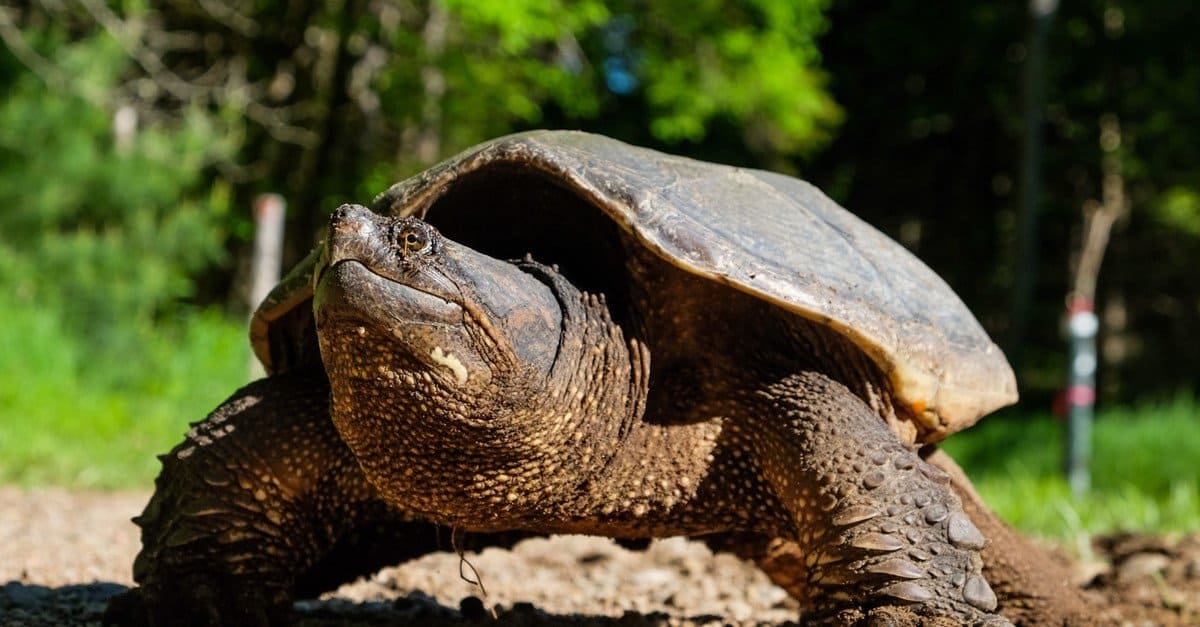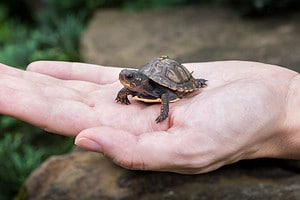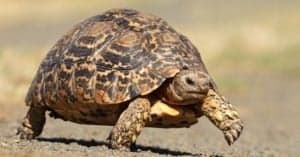The common snapping turtle is one of the most well-recognized terrapins in existence, and that’s in part due to the fact that its habitats spread from Nova Scotia in the north to the Gulf of Mexico in the south. The flexibility of the snapping turtle’s diet definitely has a role to play in both its broad geographic distribution and its popularity as a pet.
On the surface, these voracious omnivores would appear to eat just about anything placed in front of them, but there’s a little more sophistication to their habits than that initial perception would suggest.
A research paper in Psychonomic Science indicates that snapping turtle hatchlings display dietary preferences based on the first food provided to them but that they also seem to possess an innate preference for specific diets.
This combination of the primacy effect and innate preference suggests that there’s some level of selective habits at work in the browsing habits of snapping turtles — but you wouldn’t know it by meeting one. Snapping turtles are opportunistic omnivores who have been known to devour practically everything in their path — but they have a distinct preference towards meat.
The diet of the common snapping turtle is roughly 30% vegetable matter, and the larger and more aggressive alligator snapping turtles eat significantly less vegetation and are considered primarily carnivorous.
In both instances, snapping turtles live in a pond or other form of brackish water — and their large size means that the majority of the animal life in a snapping turtle’s habitat is potentially on the menu.
Prey can range in size from small invertebrates to fish and amphibians to moderately-sized mammals and birds. Snapping turtles are even known to feed on carrion.
Snapping turtles in the wild are known to eat a diet of:
- Aquatic plants (algae, moss, duckweed)
- Fish (minnows, eels)
- Smaller turtles and frogs
- Birds (mallards, ducklings, goslings)
- Invertebrates (insects, crayfish, snails)
- Small mammals
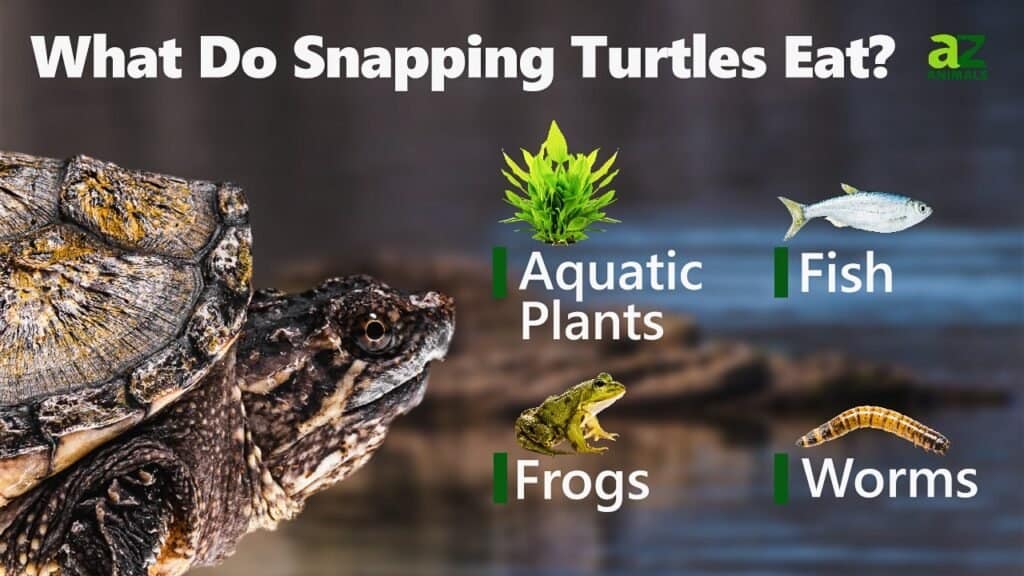
What Do Snapping Turtles Eat in Captivity vs in the Wild?
While a snapping turtle in a pond may eat anything that comes its way, that’s not a practical choice for snapping turtles in captivity. In captivity, turtles should only eat two to three times a week. Baby snapping turtles should be fed every day.
Live insects and worms found at a pet supply store make up the most common diet of a snapping turtle in captivity, but they can also be fed raw and lean meats like chicken and turkey.
Both common and alligator snapping turtles in captivity should have their diet supplemented with leafy greens. Some owners opt to feed their turtles specially formulated pellets rather than raw food.
Snapping turtles in captivity are known to eat a diet of:
- Insects (crickets, grasshoppers)
- Worms
- Crustaceans (ghost shrimp, crayfish)
- Fish (minnows, guppies)
- Raw, lean meat (turkey or chicken)
- Aquatic plants (duckweed, moss)
- Leafy greens (mustard, romaine)
How Do Snapping Turtles Hunt For Food?
The common snapping turtle can mostly be found in a pond or stream with brackish water, while the alligator snapping turtle tends to like more clearly freshwater habitats. But these are both nocturnal and exclusively aquatic hunters.
Their nightly patrol for food typically involves walking along the floor of the stream or lake they inhabit in search of prey. While younger snapping turtles will often take a proactive approach to seek out prey, older members of the species have learned more patience.
As ambush predators, adult snapping turtles will bury themselves almost entirely in the sand and simply wait for prey to come along. They have an appealing — if unusual — lure as well. The tongue of the snapping turtle resembles a worm — and when it’s the only thing visible above the surface of the sand, it’s an effective way to deliver prey directly to the turtle’s beak.
Despite their slow appearance, these turtles can lunge incredibly fast and with serious power. The 200+ newtons of force that they apply when chomping down is usually overkill — and the most typical method for dismembering larger prey is to simply decapitate them.
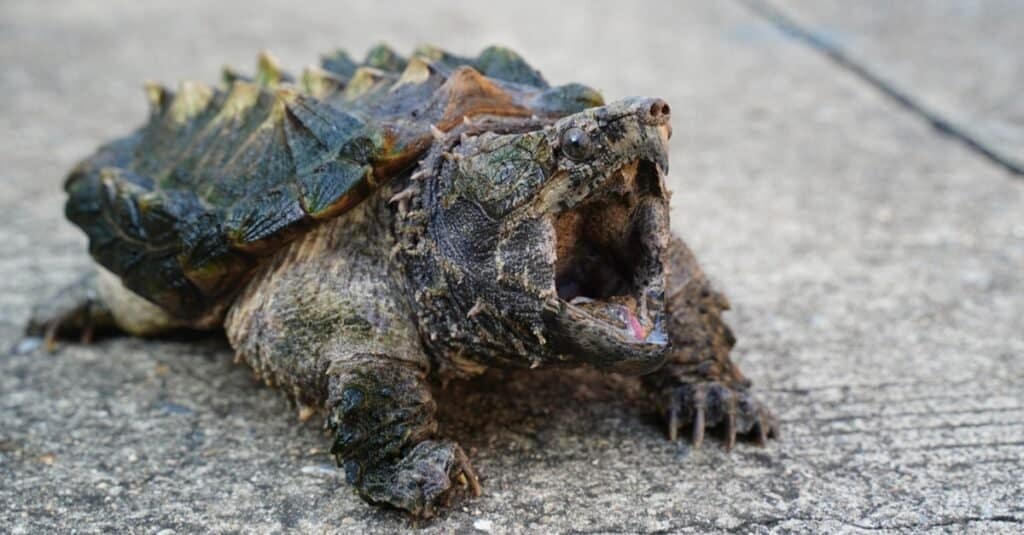
©Sista Vongjintanaruks/Shutterstock.com
What Animals Eat Snapping Turtles?
The combination of large size, tough shells, and powerful jaws make the snapping turtle an unappealing choice of meal to most predators. Common snapping turtles are sometimes killed by larger alligator snapping turtles, and both American alligators and river otters have also been known to occasionally snack on them.
There have even been rare instances of adult snapping turtles being hunted by black bears. Fortunately, their ambush tactics as predators also help keep them safe from the eyes of predators.
Snapping turtle babies and eggs are obviously more vulnerable threats to predation, and hatchlings find themselves vulnerable to threats from both water and land. Large fish like pike and bass, water snakes like the cottonmouth, and mammals like mink, raccoons, and foxes all pose a threat to baby turtles.
The eggs and hatchlings of snapping turtles are also sometimes cannibalized by other snapping turtles, great blue herons, and even some predatory fish like largemouth bass. However, as snapping turtles age, they become less and less vulnerable to attack.
But the biggest threat to both adults and babies may be humans. Both alligator and common snapping turtles are often taken from their habitats to be sold as pets. Alligator snapping turtles are even facing declining populations thanks to a demand for their meat.
Next Up…
- 10 Amazing Turtles in North Carolina – Check out this amazing 10 turtle species found in NC!
- 8 Types of Turtles in South Carolina – SC is known for many things, but are turtles one of them? Check out these turtles that call South Carolina home!
- 12 Captivating Turtles in Connecticut – Take a look at some of these amazing turtles found in Connecticut!
Thank you for reading! Have some feedback for us? Contact the AZ Animals editorial team.

